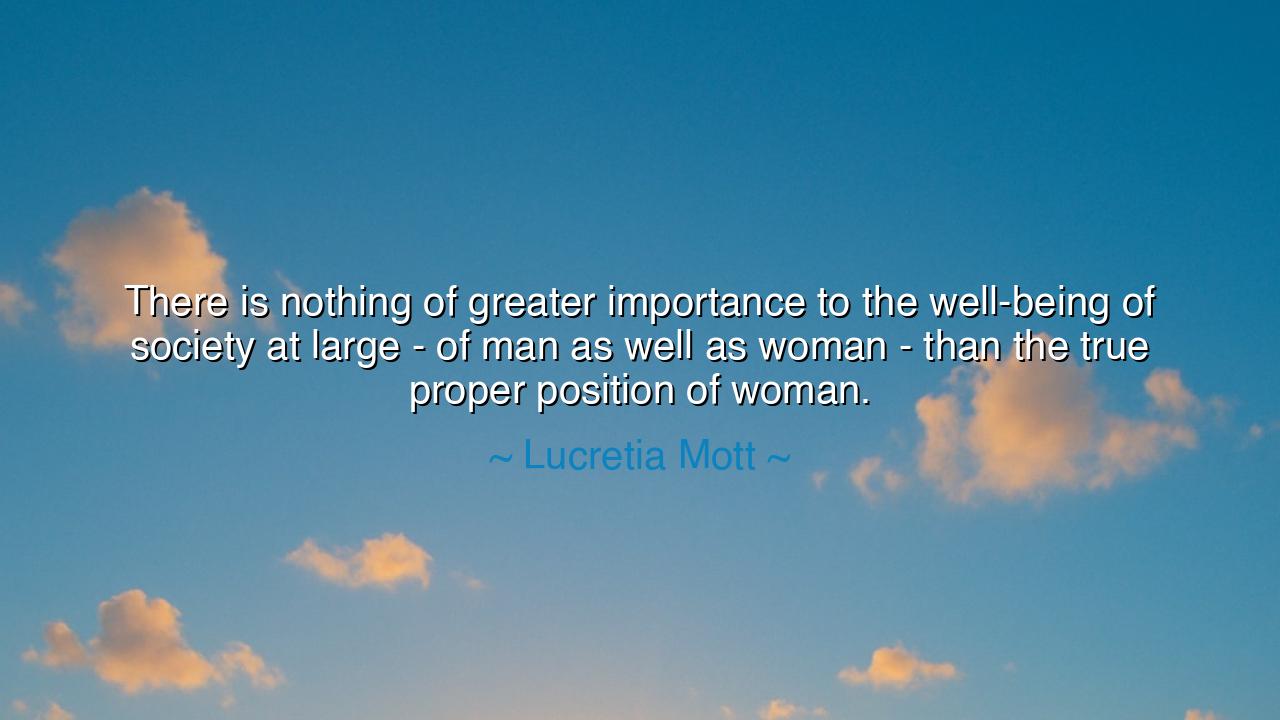
There is nothing of greater importance to the well-being of
There is nothing of greater importance to the well-being of society at large - of man as well as woman - than the true proper position of woman.






Hear the words of Lucretia Mott, a voice of fire and conscience in her age: “There is nothing of greater importance to the well-being of society at large—of man as well as woman—than the true proper position of woman.” This is not a cry of vanity, nor a narrow claim for privilege, but a declaration of justice, of balance, of the harmony upon which all communities must rest. For how can a house stand if half its pillars are bound? How can a nation flourish if half its spirit is silenced? The position of woman is not a question for women alone, but for all of humanity, for the chains upon one are chains upon all.
The ancients themselves bore witness to this truth, though often they did not honor it. Recall the words of the poet Sappho, whose verses outlived empires, though she was but a woman upon a small island. Her voice, preserved in fragments, sang of love and longing with such power that even the greatest philosophers felt her shadow upon their thought. Yet how many women of her age were silenced, their wisdom unrecorded, their hands bound to obscurity? Their absence is the measure of what society lost by denying the full position of woman.
Lucretia Mott, living in the 19th century, saw clearly what so many refused to see: that the liberation of women was not a threat to men, but a salvation for them. In her time, women were denied the right to vote, to speak in public, to guide the laws that governed their own lives. Yet she knew that to confine women was to cripple the moral and intellectual body of the nation itself. Her activism, woven into the great struggle for abolition and for suffrage, proclaimed that the dignity of one cannot be separated from the dignity of all.
Consider the tale of the Iroquois Confederacy, a people whose governance inspired even the framers of America. Among them, women held powerful roles: the Clan Mothers, who chose and guided the chiefs, who kept alive the traditions, who safeguarded the future of the people. Their position was not beneath man, nor above him, but alongside him, as partner and equal. And in that balance, their society endured for centuries, bound not by domination but by shared responsibility. This, too, is the wisdom Lucretia Mott called us to remember—that true civilisation rests upon harmony, not hierarchy.
What lesson do we take from her words? That no society can claim greatness if it denies the proper position of woman. For when women are silenced, half the wisdom of the earth is buried. When women are excluded, half the strength of the earth is wasted. And when women are demeaned, the dignity of all is diminished. The path to the well-being of mankind runs through the liberation and recognition of womankind.
Therefore, let us act. In our homes, respect the voices of daughters, wives, sisters, and mothers, not as ornaments but as equal bearers of truth. In our workplaces, seek justice, not tokenism, ensuring that the talents of women are honored with the same weight as those of men. In our laws and our nations, defend the rights of women as the rights of humanity itself. For this is not charity, nor concession, but restoration of what was always rightful.
And finally, remember this: the struggle for the true proper position of woman is not merely a cause of the past, but an eternal vigilance of the present. For there will always be forces that seek to diminish, to silence, to bind. Stand against them with courage. Let your voice, whether man or woman, echo Mott’s truth. For only when woman stands in her rightful place, alongside man, shall society be whole, and only then shall civilisation flourish in its fullness.






AAdministratorAdministrator
Welcome, honored guests. Please leave a comment, we will respond soon